To
Noordin M. Haji, OGW, CBS Director of Public ProsecutionsIntroduction
. The ODPP is established under Article 157 of the Constitution of Kenya, 2010 and is headed by the Director of Public Prosecutions (DPP).
. The DPP, in discharging the mandate of the ODPP, operates independently as stipulated under Article 157(10) of the Constitution.
. Article 157 (4) of the Constitution, gives the DPP powers to Direct the Inspector General of the National Police Service to investigate any information or allegation of criminal conduct and the Inspector General shall comply with any such direction.
. Further, the report highlights ODPP’s efforts towards its transformation into a 21st Century Prosecution Service, by encompassing technology, Progressive prosecutions, critical thinking and communication in its service deliver
. Further, while exercising the powers conferred upon the office, the DPP should have regard to the public interest, the interest of the administration of justice and the need to prevent and avoid abuse of the legal process as enshrined under Article 157 (11)
Mandate of the ODPP
The mandate of the ODPP, as provided under Article 157 0f the Constitution of Kenya, 2010 is to exercise State Powers of prosecution. In exercising the State Powers of Prosecution, the DPP can:
Institute and undertake criminal proceedings against any person before any court of law other than the court martial in respect to any been committed by that person;
Take over and continue with any criminal proceedings commenced in any court by any person or authority with the permission of the person or authority; and
Discontinue, at any stage before judgment is delivered, any criminal proceedings with the permission of the court.
Functions of the ODPP
To
THE ACCOUNTABILITY AND REPORTING FUNCTION OF THE OFFICE
Pursuant to Article 254(1)of the Constitution, 2010 and Section 7 of ODPP Act, 2013, the DPP is required to submit a report to the President and Parliament on the performance and overall fulfillment of the object and purpose of the Office. In addition, the President, the National Assembly or the Senate may require the DPP to submit a report on a particular issue. In this regard, the DPP, has consistently submitted the reports as envisaged by law.
The Department of Conventional & Related Crimes
Advisory Board
1 PS - Public Serv ce;
2 DPP - Chair of the Board
3. Attorney-Genera







4 PS - Treasury
5 Chief Registrar of the Jud ciary
6. Chairperson - LSK
7 Director, Witness Protection Agency
8 Chairperson, KNCHR
9 Inspector General - NPS
10 SPP - Secretary to the Board
The Director of Public Prosecution’s Office
9 Regions headed by Regional heads
The Department of Economic, Organized & International
The Department of County Affairs & Prosecution
47 County Stations headed by County heads
The Secretary Public Prosecution’s Office
139 Court stations
The Prosecution Training Institute
The Department of Corporate Services
Department of Inspectorate, Quality
ODPP STAFF ESTABLISHMENT

Currently, the ODPP has a staff establishment of 1315 officers made up of 614 male and 701 female making 46.7% and 53.3% .The ODPP takes up 100 pupils, 100 interns and attachés each Financial Year.
Financial Status
The Overall Resource Allocation
The overall budgetary allocation to the ODPP for the FY 2022/23 amounts to KShs 3.327 billion consisting of KShs 3.282 billion for Recurrent Expenditure and KShs 0.45 billion for Development Expenditure. This allocation is against the ODPP’s resource requirement of KShs 5.037 billion. Consequently, the ODPP has an overall resource deficit of KShs 1.710 billion. A detailed analysis of the budget is presented below
budgeted 3.327B
Strategic Focus
The ODPP is guided by its Excellence Charter 2020-2023, which contains the ODPP’s 6 strategic commitments designed to oversee the implementation of its mandate to better serve the Mwananchi
The ODPP Strategic Commitments include:
Independence & Integrity;
The ODPP maintains the highest levels of integrity and independence and adherence to the national values and principles enshrined in the Constitution of Kenya. In line to develop policies, guidelines, and mechanisms that seek independence and integrity.
Lifelong Learning;
The ODPP continues to enhance the knowledge and training and mentorship. This responsive to the needs of the public and the ever-changing nature of crime. Towards this end, the ODPP continues to enhance the capacity of the Prosecution Training Institute to facilitate Lifelong Learning.
Reshaping Prosecutions;
The ODPP recognizes that duties must be carried out without fear or favor and that all decisions must be guided by professionalism and integrity. its processes and practices to equip itself as a 21st Century prosecution service.
Organizational
Leadership;
Inter-agency Networks; Excellence Charter, recognizes the importance of stakeholder engagement in the delivery of services and continues to create and enhance networks that are system.
to strengthening and maintaining its organizational responsive organizational structure, robust processes and procedures, focus on the delivery of quality prosecution management and regular monitoring and evaluation.
Leadership is one of the key reform areas at the ODPP. The qualities such as tenacity, vision, and the ability to inspire and willingness to support others.
This will encourage innovation and enhance work performance, skills and talent development.
THE DECISION TO CHARGE
SOPS MANUAL & RAPID REFERENCE GUIDE ON PROSECUTION OF FGM CASES
DEFERRED PROSECUTION AGREEMENT
A PROSECUTOR’S GUIDE TO CHILDREN IN THE CRIMINAL JUSTICE SYSTEM
RRG ON PROSECUTION OF SGB CASES IN KENYA
DIPLOMA IN PROSECUTIONS
PRACTICE DIRECTIONS ON THE DELEGAT OF PROSECUTORIAL POWERS
DIVERSION GUIDELINES

ODPP COMPENDIUM ON ELECTORAL JUSTICE


PLEA BARGAINING GUIDELINES

ODPP POLICY DEVELOPMENT
ENHANCE ACCESS TO JUSTICE.
PRIORITY AREAS
CONSTRUCTION OF THE PROSECUTION TRAINING INSTITUTE (PTI).
INSPECTORATE & QUALITY ASSURANCE
GREENING AND DEVELOPMENT OF ENVIROMENTAL POLICIES.
COMMUNITY AND PUBLIC ENGAGEMENTS
DIGITIZATION OF ODPP PROCESSES.
PRIOTIZATION OF THE FIGHT AGAINST TRANSNATIONAL ORGANIZED CRIME

THE ROLE OF THE ODPP IN NATIONAL DEVELOPMENT
The ODPP plays its role the realization of Kenya’s Development Agenda through the exercise of its prosecutorial mandate and by way of implementation of its policies.
• The ODPP has aligned its mandate, operations and strategies with the Vision 2030, Sustainable Development Goals, Medium Term Plans, Government Development Blue Print and other Government of Kenya Policies.
• The ODPP contributes to the objective of efficient and effective delivery of justice in the country by enhancing investigative and prosecutorial jurisdiction of cases.
• The ODPP is under the political pillar charged with the duty of aligning the national policy and a legal framework that addresses a market-based economy, human rights and gender equity in addition to promotion of the rule of law.
• Under the economic pillar, the ODPPs role is to ensure an effective and efficient prosecution that will in turn contribute to safe, secure and conducive environment for investment and economic growth.
• The ODPP plays a key role across all of the 3 pillarspolitical, economic and social – on which the Vision 2030 is premised, whose mid-term plans (MTPs) the ODPP has been actively involved in the
• Finally, on the social pillar, the ODPP contributes in the quest for a just and cohesive society by serving the interests of justice by conducting timely and independent prosecutions and facilitates equitable application of the law that eases access to the criminal justice system.
PROSECUTION PERFOMANCE
Over the last two reporting periods, a total of 377,137 criminal cases were filed in courts across the Republic. There was an increase of 3.77% in criminal cases filed in 2021/2022 compared to the 2020/2021.
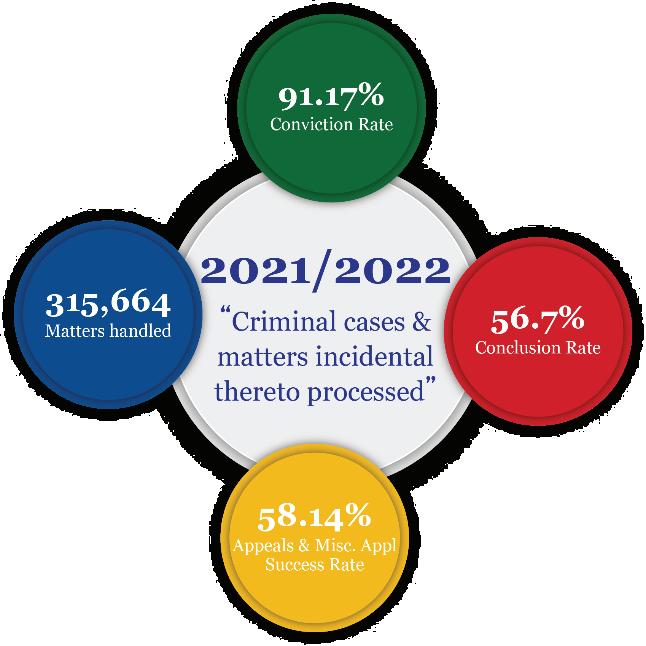
Performance at a glance
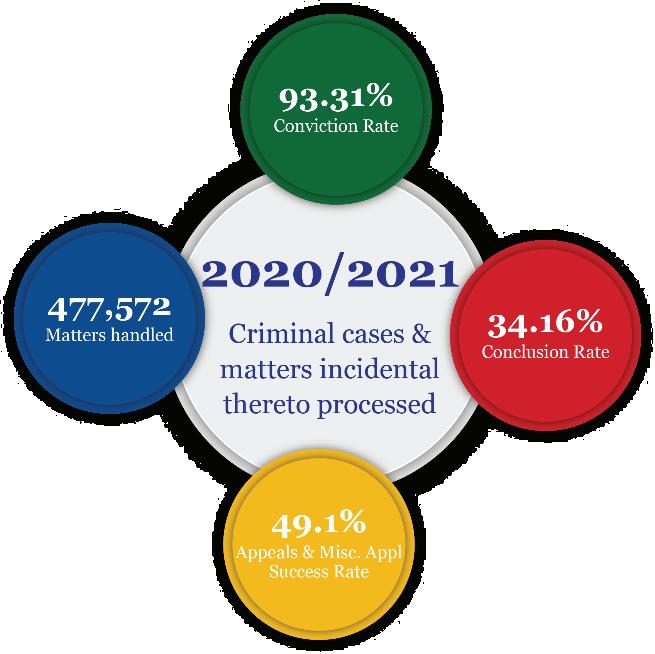
Prosecution Perfomance .......Continued
CORRUPTION CASES HANDLED
Outcome of concluded anti-corruption and economic cases.

ODPP INTERAGENCY CORDINATION AND COLLABORATION
ODPP Cooperation Strategies
• Cooperation in accordance with the ODPP Act.
• Participation in the National Council on Administration of Justice (NCAJ).
• Participation in the Court Users Committees (CUCs).
• Involvement in Governance Justice Law and Order Sector Forums (GJLOS).
• Implementation of Multi-Agency Task Teams (MAT).
• Membership to the Kenya Leadership and Integrity Forum.
• Community Dialogues.
All Ministries interact with the ODPP either as:
• Complainants.
• Accused.
• Victims.
• Witnesses.
• Experts.
ODPP Interacts with;
• The Public.
• Facilitative Ministries that include; State Law office, Treasury, Ministry of Interior, Ministry of Information, Public Service, Foreign Affairs among others.
• Stakeholders including; The Judiciary, Investigative agencies, Correctional services and The Children Department among others.
Delegation of Prosecutorial Powers
Persuant to Article 157 of the Constitution, the ODPP may deligate prosecutorial powers to the following institutions;
. Kenaya Revenue Authority (KRA).
. National Enviromental Management Authority (NEMA).
. National Social Security Fund (NSSF).
. County Governments.
. Kenya Wildlife Service (KWS).
. Pharmacy and Poisons Board.
. Anti-Counterfaait Agency (ACA).
. National Transport and Safety Authority (NTSA).
ODPP INTERAGENCY CORDINATION AND COLLABORATION .................... Continues
POLICY PLANNING AND DEVELOPMENT
PROVIDING ADVISE ON CONSTITUTIONAL POLICY AND PROCEDURAL
STEERING THE GOVERNMENT’S DEVELOPMENT AGENDA.
THE ODPP INTERACTS WITH MINISTRIES THROUGH;
COORDINATION OF THE GOVERMENT’S LEGISLATION PROGRAMME.
GUIDANCE ON DECISION MAKING ISSUES ESPECIALLY ON CRIMINAL MATTERS.
1 2 3 4
Under section 71(1) of the Public Service Commission Act, 2017, a public officer charged with a serious criminal offence may be suspended by an authorized officer from the exercise of the functions of the public officepending consideration of the public officer's case under this Act. Similarly, under section 62 of ACECA, State and Public Officers charged with corruption or economic crimes shall be suspended.
All CSs are State officers, and therefore public officers and therefore subject to the provisions of the PSA and the ACECA.
Such charges also lead to disruption of business in the Ministries where persons of interest are subject of investigations and or prosecution which disruptions may be occasioned by e.g. the collection of documents, equipment or the arrest of senior management staff.
Such investigations and or prosecutions may also lead to the shutting down of businesses leading to disruption of businesses and loss of jobs. Finally, the charges and prosecutions have a negative effect on the public confidence.
STATISTICAL PROJECTION OF PROSECUTION OF SELECT CATEGORY OF CRIMES
Land and environmental cases filed in court forecasted
Land and environmental cases filed in court have consistently increased over the last five years and are projected to further increase markedly over the next four years to over 2000 cases filed in a single year in 2026. This will be a 900% increase in comparison to cases filed in 2018 and 109% increase in comparison to cases filed in 2022.
Values Forecast
Corruption cases handled forecasted
Anti-corruption cases handled over the last seven years have been on the decline. The decline over the last five years is attributed to the strategic focus on high impact cases which was intended to serve as a deterrence measure. Thedecline is projected to further go down below the 300 cases mark in 2024.
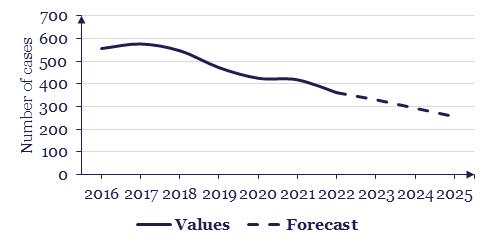
SGBV related cases filed in Court Forecasted
SGBV cases filed in court over the last five years have been generally on an increase. The increasing trend is projected to continue in the next three years climaxing at about 18,000 cases in 2025. Unfortunately, majority (over 65%) of these cases are defilement cases. This is a worrying trend and a matter of great concern to all of us.
Murder Cases Filed in Court Forecasted
The murder cases filed in court over the last five years have been on a wavy but incremental trend. The trend is projected to continuous in the same pattern over the next three years.

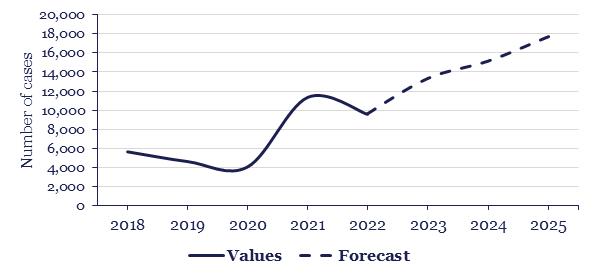
Withdrawal of murder cases
There was a dip in number of cases withdrawn in 2020 attributed to the trend since then has been on the increase and is projected to slightly drop in 2023 before again increasing in 2024 and 2025.
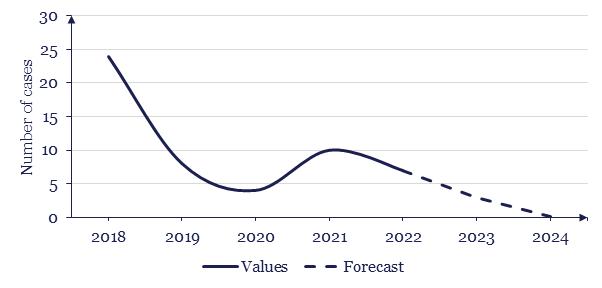
A high number of cases withdrawn in 2018 is attributed to an application by former CS Eng. Kamau which challenged cases filed in court when EACC was dimmed not properly constituted. The cases withdrawn slightly increased in 2021 before decreasing marginally in 2022 and the decreasing trend is projected to continue over the next two years where a zero withdrawal will be attained in 2024. This is in line with our strategy of implementing the decision to charge policy which require study preparation of case before being presenting before a court of law.

MILESTONES
POGRESSIVE PROSECUTION INCLUDING; PLEA BARGAINING
PROSECUTORIAL CHALLENGES
ACQUISITION OF MV ADIL BOAT FOR THE LAMU OFFICE

. Inadequate Human Resource Capacity.
. High staff Turnover.
. Inaccessibility of Mobile Court Stations
DEVELOPMENT OF POLICIES & LEGAL FRAMEWOR
CONSTRUCTION OF PHASE 1 OF THE PTI
DEVELOPMENT OF ICT INFRUSTRACTURE INCLUDING; ROLL-OUT OF THE UADILIFU CASE MANGAEMENT SYSTEM








INCREASED PUBLIC ENGAGMENTS THROUGH THE ODPP CAFE’, COMMUNITY DIALOUGES, SOCIAL MEDIA PLATFORMS AMONG OTHERS
. Inadequate Infrastructural and Operational Capacity
. Emerging Complex Crimes
IMPROVED STAFF WELFARE THROUGH ESTABLISHMENT OF A STAFF CLINIC
. Slow Judicial Process and Legislative Gaps
ESTABLISHMENT OF THE OFFICE MANAGEMENT SYSTEM
DEVELOPMENT OF AN E-LEARNING PLATFORM FOR STAFF

Introduce Anti-corruption in educational curricular.
Implementation of resolutions made by regional and international forums.
ODPP PRIORITY AREAS
Enter into Bi-lateral and multi-lateral agreements and treaties/ MOUs to enhance international Cooperation.
Embracing of technology to improve efficiency in the criminal justice process.
Joint trainings with other agencies in the criminal justice sector.

